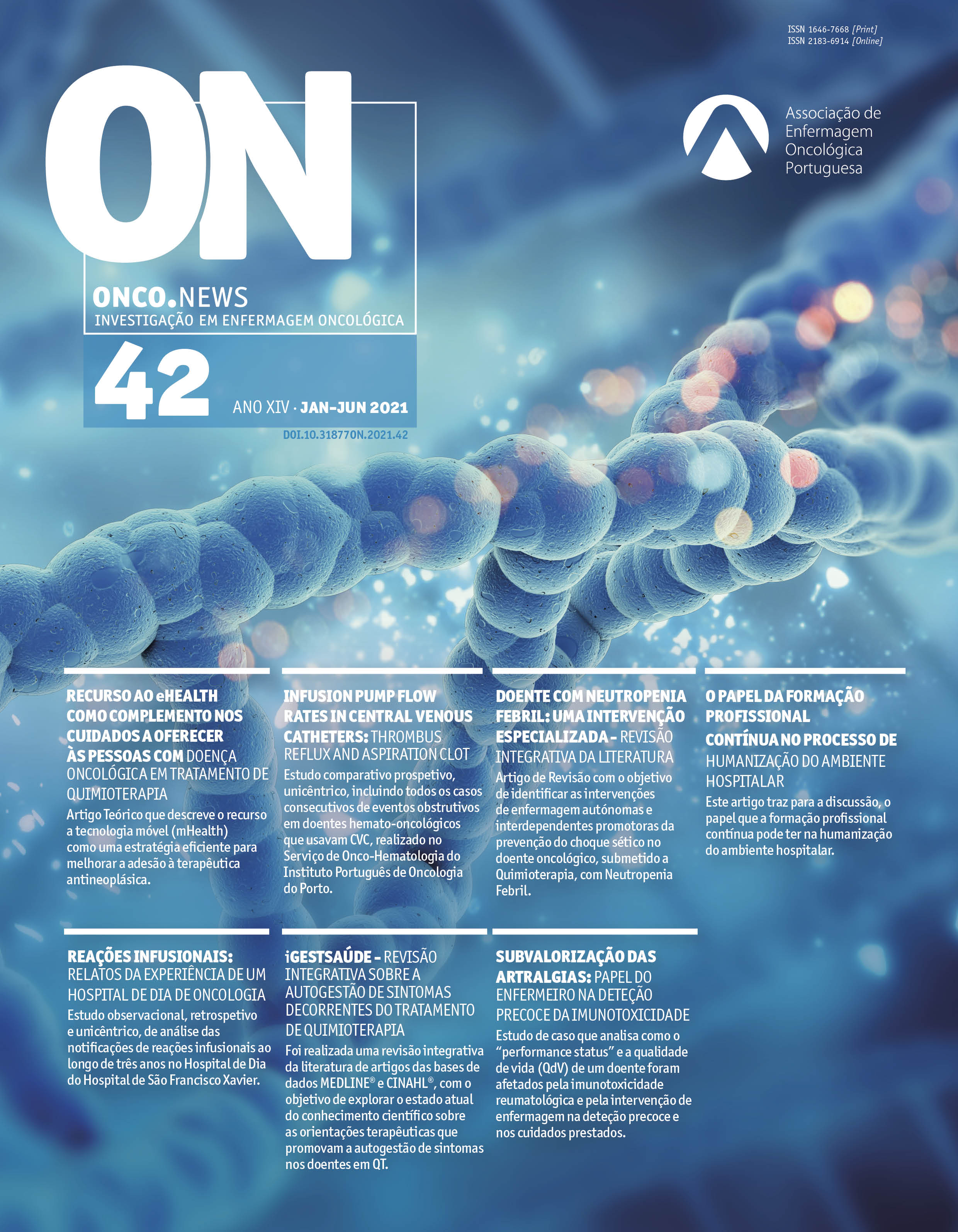Infusion Reactions: Experience in Oncology Day Care Unit
Keywords:
Infusional reactions, Antineoplasic drugsAbstract
The administration of antineoplastic drugs can generate immediately hypersensitivity reactions, in Oncology-Day Care Unit hospitals. The incidence and severity are difficult to predict and the signs and symptoms vary, ranging from erythematous skin reactions to severe anaphylactic reactions, with a lethal risk. Prevention is essential to reduce the prevalence and severity of these events and early recognition is a key element in resolving the condition. The objectives of the present study were: reviewing of infusion reactions in our institution, particularly, their severity, incidence, drug, subsequent reactions, type of pre- and post-medication administered. We also defined a sub-analysis to identify predictors for subsequent reactions. Observational, retrospective and single-center study, analyzing the reports of infusion reactions over 3 years. Demographic data and information regarding the infusion reaction situation were collected. Data analysis was performed using descriptive statistics, t test, Fisher’s exact test and logistic regression, using the software StataIC 15.1 (StataCorp LLC). The review of the patient’s pathological and allergic history, the monitoring compliance to premedication, therapeutic reconciliation and surveillance of vital signs are essential in the initial preinfusion assessment of antineoplastic treatments. In our study, the prevalence of infusion reactions to taxanes and platinum is in line with previous reports in the literature. Institutional reviews of adverse events are crucial to improve current practices and develop more efficient practices.Downloads
References
ESMO Handbook series, ESMO Handbook Of Oncological Emergencies, 2nd Edition. Europeann Society of Medical Ocology, 2016.
NCI - Common Terminology Criteria for Adverse Events (CTCAE) version 5.0. U.S. Department of Health and Human Services. Published november 27,2017.
ESMO – Guidelines Commitee. Management of infusion reactions to systemic anticancer theraphy: ESMO Clinical Practice Guidelines. Annals of Oncology 2017; 28 (supl. 4): 100-18.
Reações de Hipersensibilidade em Oncologia, 2ºEdição. Editoras: Ana Joaquim (SPO), Joana Silva (AEOP) e Susana Cadinha (SPAIC) – Apoio Merck, Dez 2017.
Polyzos A, Tsavaris N, Kosmas C et al. Hypersensitivity reactions to carboplatin ad-ministration are common but not always severe: A 10-year experience. Oncology
;61:129-133.
Gowda A, Goel R, Berdzik J et al. Hypersensitivity reactions to oxaliplatin:Incidence and management. Oncology (Willistion Park) 2004;18:1671-1675; discussion 1676, 1680, 1683-1684.
Brandi G, Pantaleo MA, Galli C et al. Hypersensitivity reactions related to oxaliplatin (OHP). British Journal of Cancer 2003;89:477-481.
Muallaoglu S, Disel U, Mertsoylu H, Besen A, et al. Acute infusion reactions to chemotherapeutic drugs: A single institute experience. J BUON. 2013;18:261–7.
Downloads
Published
How to Cite
Issue
Section
License
Copyright (c) 2021 Sandra Ponte, Carla Santos Cabral, Patrícia Cavaco, Leonor Vasconcelos de Matos, Leonor Fernandes

This work is licensed under a Creative Commons Attribution-NonCommercial-ShareAlike 4.0 International License.




